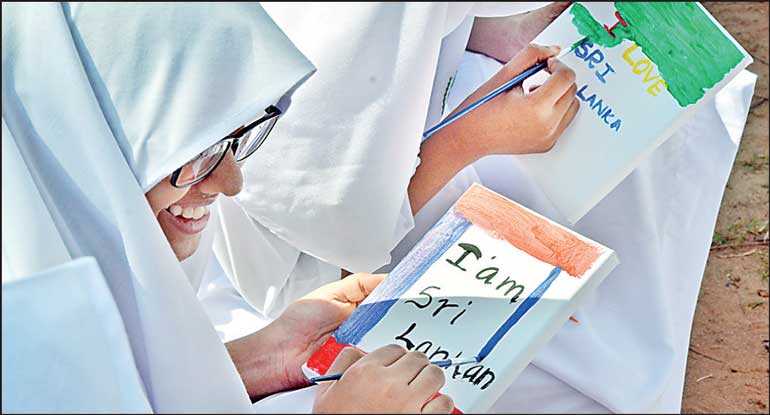Sunday Feb 22, 2026
Sunday Feb 22, 2026
Saturday, 4 May 2019 00:00 - - {{hitsCtrl.values.hits}}

It is necessary for other Sri Lankans to integrate into Muslim communities to promote peace and harmony with a sound understanding. It is the responsibility of Sri Lankan Muslims to take every step to Sri Lankanise their activities while retaining their Islamic identity – Pic by Shehan Gunasekara
By Rt. Rev’d. Keerthisiri Fernando
In the context of the recent happenings (Easter disaster 2019) of Sri Lanka, it has become decisive to have a sound understanding of the ethno-religious identities to promote peace and harmony in this relatively small island in the Indian Ocean.
Generally speaking Sri Lankan society is comprised of four main world religions (Buddhist, Hindu, Christian and Islam) and four ethnic categories (Sinhala, Tamil, Muslim and Eurasian [Burgher]), which have been creating and recreating identities in all part of this country. Therefore to have a comprehensive understanding of Sri Lanka it is necessary to have a critical analysis of these identities prevailing in Sri Lankan society. The majority Sinhala ethnicity (about 72%) has given the foundation for Buddhist religious identity. On the other hand Buddhism has given the strength to develop and sustain the Sinhala ethnic identity. With political independence from the British Empire in 1948 this majority ethno-religious identity has been dominating all socio-cultural and political affairs of Sri Lanka.
At times this majority identity has been intruding into other minority identities, creating a fear psychosis among these communities. These intrusions have forced the minorities to strengthen their identities in various ways to exist as effective entities in societies in different parts of the island. Here the fact that these ethnic and religious minorities share their identities with the rest of the world has become critical in strengthening their respective identities. Christians (about 7%) who ethnically belong to Sinhala, Tamil and Eurasian categories have been strengthening their identities with respective denominations that they belong to throughout the world. This has been facilitated by their knowledge of the international language, English, and the relationships with the international world.
Religiously Hindu and ethically Tamils have extensive links with the international world. This is cemented with the Sri Lankan Tamil immigrant communities in various parts of the world who migrated to those countries in the context of the civil war in Sri Lanka.
Where Sri Lankan Muslims are concerned, the fact that in the identity of Islam, ethnicity and religion are intertwined has been playing a vital role. Because of this reality, unlike other religions and ethnicities with their ethno-religious identities, in Islamic identity Sri Lankanisation has been minimum. This has created space for many believers of Islamic faith to get isolated in Sri Lankan society.
Now it is very clear that this isolation has been enabling international radical Islamic groups to influence a tiny minority of Sri Lankan Muslims, even to the extent of training suicide bombers.
In this particular background it is necessary for other Sri Lankans to integrate into Muslim communities to promote peace and harmony with a sound understanding. It is the responsibility of Sri Lankan Muslims to take every step to Sri Lankanise their activities while retaining their Islamic identity.
(The writer is the Bishop of Kurunegala, Church of Ceylon.)